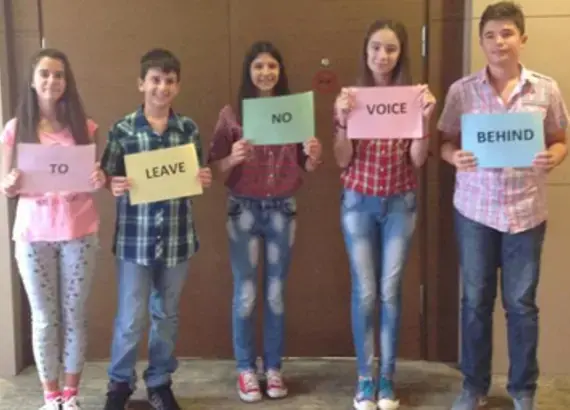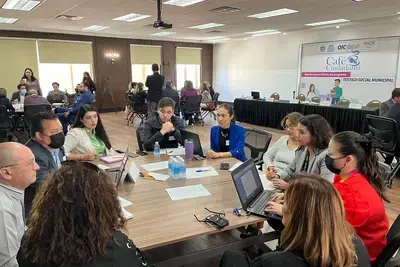
Success Story
Global Campaign to Open Legislatures Draws Broad Support
Civic activists and government reformers in at least 30 countries rallied behind open legislatures to promote values of transparency, inclusion and participation in the lawmaking process during the first-ever Global Legislative Openness Week (GLOW) Sept. 15 to 25.
GLOW kicked off on the International Day of Democracy and was designed to help legislatures share tools and strategies for engaging their citizens, particularly tech-empowered youth. The week was organized by the Open Government Partnership (OGP)’s Legislative Openness Working Group, which is co-anchored by the Chilean Congress and NDI.
At OGP’s High-Level Event on the margins of the UN General Assembly Sept. 24, President Enrique Peña Nieto of Mexico, which now holds the chairmanship of OGP, noted parliamentary openness as among its priorities: "a fin de que más reformadores puedan colaborar en un mayor número de ámbitos, impulsaremos iniciativas de Parlamento abierto..." ("so that more reformers can collaborate on a larger number of issues, we will promote initiatives on open parliament ...")
Events organized in conjunction with GLOW showcased the diversity of the global open-government movement and demonstrated that every society can take action toward openness, although institutional structures and technological capacities vary widely. Here are just a few of the events organized as part of GLOW:
 Serbian civil society organization Otvoreni Parlament organized “Yes to Open Parliament” street actions in six cities.
Serbian civil society organization Otvoreni Parlament organized “Yes to Open Parliament” street actions in six cities. - In Montenegro, the OGP Legislative Openness Working Group and the Parliament of Montenegro held a two-day meeting to explore issues of legislative openness and how they can be advanced through the OGP process. The meeting, which featured members of parliament, parliamentary staffers, and civil society representatives from 15 countries, helped strengthen relationships among those groups around issues of legislative openness.
- In Jordan, the speaker of parliament met with the Al Hayat Center for Civil Society Development to receive a letter on the importance of open parliamentary data. Al Hayat also released issue briefs on legislative transparency topics, and organized a series of local meetings between members of parliament and their constituents.
- In Mexico, the Senate, Chamber of Deputies and Federal Institute for Access to Public Information and Data Protection (IFAI) joined civil society organizations in launching the Open Parliament Alliance, an institutional platform that will coordinate efforts to strengthen transparency, accountability and citizen participation.
- In South Africa, the People’s Assembly website released an infographic measuring the South African Parliament’s progress against benchmarks based on the Declaration on Parliamentary Openness.
- In Australia, the Open Australia Foundation invited local coders to work with parliamentary data during a weekend civic-hacking event. The ‘hackfest’ attracted more than 45 participants and generated a record 18 pull requests. Civil society organizations in Israel and Denmark also organized workshops around parliamentary data.
- In Guatemala, the International Republican Institute organized a video teleconference with open-data experts in Mexico to discuss how legislators and civil society can use open data to promote accountability and stronger governance. The audience in Guatemala included members of congressional commissions, civil society groups working on transparency and OGP commitments, and university students.
- In Serbia, Otvoreni Parlament organized a series of “Yes to Open Parliament” street actions in six cities.
- In Brazil, the Hacker Lab of the Chamber of Deputies hosted a hacker weekend for experts and software developers to propose ideas and showcase projects aimed at legislative transparency -- including Olho nas Emendas (Eye on Amendments) and Vigia Político (Politicswatch).
- In Poland, Gdansk Mayor Paweł Adamowicz recorded a video in support of GLOW, and the Lech Walesa Institute organized a Code for Freedom civic hackathon in partnership with ePanstwo Foundation and Teplitsa.
- In Chile, the OGP Legislative Openness Working Group hosted its first global meeting. Members of the working group shared recent developments in parliamentary openness and drafted recommendations to the OGP Steering Committee for incorporating parliaments more effectively into the OGP process. This meeting occurred alongside the ParlAmericas Plenary Assembly, which included discussions of open parliaments on its agenda.
- In six countries across Latin America, the Latin American Network for Legislative Transparency presented its second Index on Legislative Transparency.
- Around the world, more than 100 parliamentary monitoring organizations signed onto an advocacy letter written by the Sunlight Foundation, which calls for parliamentary data to be open by default.
In addition to these events and several others, hundreds of individuals and organizations broadcast their support for GLOW on social media. The speaker of the UK House of Commons, Rt. Hon. John Bercow, recorded a video message for the meetings in Chile and Montenegro, both of which included representation from the Speaker’s Commission on Digital Democracy. Others weighing in to support legislative openness included NDI’s Chairman Madeleine K. Albright, U.S. Representative Darrell Issa, Mexican Senator Arely Gómez González and New South Wales (Australia) Legislative Council Member Penny Sharpe, who expressed their support for GLOW on Twitter. In all, the #OpenParl2014 hashtag has been used in over 3,700 tweets. Visit openparl2014.org for more details about the week’s events.
Read more:
Published Sept. 30, 2014



